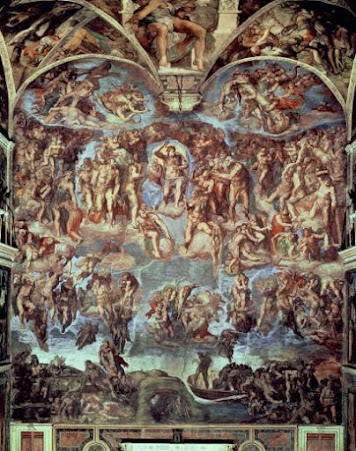
2nd Sunday of Advent B
Readings: Isaiah 40:1-5,9-11 2 Peter 3:8-14 Mark 1:1-8
Semper paratus! “Always prepared!” This motto describes the mood of the readings for the Second Sunday of Advent. John the Baptist, the messenger and herald in the wilderness, alerts us to be prepared for the arrival of the One who will bring God’s creative Spirit to make all things new. With confidence, let us pray the lyrics of the responsorial psalm. “The Lord will make us prosper/ and our earth shall yield its fruit. Justice shall march before him/ and peace follow his steps” (Ps 85:14).
The first reading is the commissioning of the prophet scholars call Second Isaiah. He is given the task to prepare the weary Jewish exiles in Babylon for God’s glorious action in bringing them home to Jerusalem. Without the preparatory message of this “herald of glad tidings,” the exiles might never have understood that their release from Babylon by Cyrus, the King of the Persians, was God’s saving action in their behalf. The prophet is called to ready this people by proclaiming “comfort” to Jerusalem which has paid double for her past sins and will now see her Lord God bringing home his flock like a shepherd gathering his lambs. In the imaginative poetry of the prophet, the way home from Babylon to Jerusalem will be a super highway across the Arabian desert. “In the desert prepare the way of the Lord! Make straight in the wasteland a highway for our God!”
Sometimes an event which we most eagerly anticipate is delayed by circumstances beyond our control, causing us to lose the fervor of our initial anticipation. The Second Peter reading challenges those who are disappointed by the delay of Jesus’ expected return in glory. Some Christians, concluding that Jesus will never come in judgment, are leading dissolute lives (see 2 Peter 2). Second Peter reminds them that God’s time table is different from humans and that what appears as a “delay” should be grasped as an opportunity for “all to come to repentance.” In the time of waiting, the letter exhorts Christians to be people of exemplary conduct whose lives hasten the arrival of God’s kingdom, the “new heavens and new earth where, according to his promise the justice of God will reside.”
Mark’s presentation of John the Baptist in our Gospel both calls us to repentance in preparation for the arrival of God’s kingdom and alerts us to expect the mighty action of God’s Spirit with the coming of Jesus. Although Mark attributes the opening prophecy to Isaiah, it is actually a combination of elements from Exodus 23:20, Malachi 3:1, and Isaiah 40:3. John the Baptist is identified with Elijah, the messenger expected in the apocalyptic Book of Malachi, who will return to prepare the way for God’s final judgment by his sudden appearance in the Temple. Contrary to Malachi’s expectations, John appears in the Judean wilderness where his message is like that of Second Isaiah: “Make ready the way of the Lord,/ clear him a straight path.” But John’s “baptism of repentance which led to the forgiveness of sins” is only preparatory to the theme of his preaching. John proclaims: “One more powerful than I is to come after me. I am not fit to stoop and untie his sandal straps. I have baptized you in water; he will baptize you in the Holy Spirit.”
John’s proclamation is the beginning of the “gospel,” the good news of Jesus the Christ, the Son of God. It prepares us for the powerful wonders Jesus will perform in the early chapters of Mark’s Gospel where he will authoritatively gather a group of apostles and begin to attack the evil dominion of Satan with the healings, exorcisms, and the proclamation of forgiveness to outcasts. At this stage, the initial reader would never guess that the story of this gospel will entail the violent deaths of both John, at the hands of Herod Antipas, and Jesus, at the hands of Pilate. Later in the Gospel, Jesus will explicitly link his fate with John’s. When Peter, James and John descend from the mount of transfiguration, they ask Jesus, “Why do the scribes say that Elijah must come first?” Jesus answers, “Elijah will indeed come first and restore all things, yet how is it written regarding the Son of Man that he must suffer greatly and be treated with contempt? But I tell you that Elijah has come and they did to him whatever they pleased, as it is written to him.” In choosing to follow John and Jesus we choose the path that leads to the cross.




